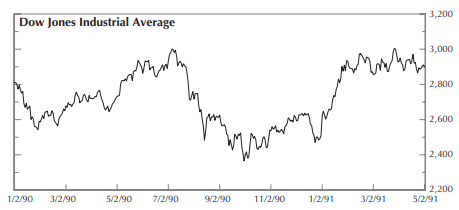While politicians and pundits ponder the merits of war, investors too must consider its consequences. Dire warnings, from higher oil prices to the costs of protracted U.S. involvement, are everywhere. At bottom, however, the pertinent question is whether the probability of war and its impact are discounted in the markets.
Our investment approach is predicated on the notion that current prices reflect the information available to the public. Those counseling you to take action in anticipation of war and its outcome are in effect suggesting that you should place a bet on war-related news, which of course is currently unknown.
If they happen to be right, they will no doubt trumpet their analytical “prowess.” However, if they are wrong they will either return to the table to place another bet, or be replaced by another who claims to be smarter. The chart below presents the weekly close for the Dow over the period encompassing the Gulf War. During the late summer in 1990, following Iraq’s invasion of Kuwait, the market fell by over 20%, while oil prices skyrocketed. Iraq had taken Kuwait virtually unopposed, and appeared to be threatening the entire Middle East. The efficacy of U.S. troops in a desert environment was untested, and Iraq’s reputedly formidable military was acknowledged to be capable of inflicting major casualties. But in very short order it became clear that Saddam’s forces were no match for the U.N. coalition. By February 1991, oil prices subsided and capital markets had returned to their prewar levels.
Markets work, whether in oil, securities, or any other good or service. While there is no question that security prices overreact and underreact to information, these swings are offsetting and obvious only in retrospect. Though war now appears increasingly likely to some, we will not hazard a guess as to whether war will transpire or what its implications might be.
Rather than focus on external events, you should instead focus your efforts on exploiting the invaluable “insider” information you possess regarding your own goals and tolerance for risk. Diligent introspection will provide insights that will allow you to design and maintain a sound portfolio consistent with our recommended allocations.

Also in This Issue:
Exchange-Traded Bond Funds
Fixed Income Investment Vehicles
Why Stay Short?
JP Morgan in the HYD Program
The High-Yield Dow Investment Strategy
Recent Market Statistics
The Dow-Jones Industrials Ranked by Yield
To access the full article, please login or subscribe below.
Already a Subscriber?
Log in now
Subscribe Today
Get full access to the Investment Guide Monthly.
Print + Digital Subscription – $59/YearIncludes 12 Print and Digital Issues
Print + Digital Subscription – $108/2 Years
Includes 24 Print and Digital Issues
Digital Subscription – $49/Year
Includes 12 Issues
Digital Subscription – $98/2 Years
Includes 24 Issues

